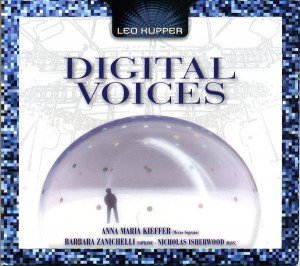
Leo Küpper (spelled without the umlaut on his Pogus releases) is firmly entrenched within the electroacoustic tradition as can be borne out by his inclusion in several of the Cultures Electroniques compilations from the sadly now defunct GMEB/IMEB.  Born in 1935, he worked with fellow Belgian electronic legend Henri Pousseur back in 1962.  Küpper’s music didn’t appear on record until 1971 when Deutsche Grammophon released his amazing “L’enclume des forces” album in their Avant Garde series.  Similarly mind blowing was his 1981 LP on the collectable Igloo label featuring the pieces “Kouros et Korê” and “Innominé”.  All three of these pieces were honorably collected on a Sub Rosa CD in 2003, rescuing them from obscurity, although unfortunately leaving off one of the other pieces no doubt due to lack of space on a single disc.  Leo had a second LP on Igloo in 1985 featuring the piece “Amkéa” and “Aérosons” which is where Leo’s Pogus disc follow from.  “Digital Voices” is Küpper’s third CD for Pogus Productions after a space of 13 years.  As might be guessed from the title, this disc focuses on pieces of treated vocal sounds.  In the five voice based pieces here, Küpper focuses on abstract vocals stating in the enclosed 40 page booklet that intelligible language distracts from hearing the actual sonorities of vocal performance.  The comparison to Luciano Berio’s groundbreaking “Visage” (1961) immediately comes to my mind and I find it specifically acknowledged by Leo in his notes.  These pieces are all much more recent, with the bulk of them composed from 2006 to 2010 and last being from 1993.  Each of the vocal pieces features a single performer: Barbara Zanichelli, Nicholas Isherwood, and his frequent collaborator Anna Maria Kieffer.  However, that said, both “Paroles Sur Lèvres” (Words on Lips) and “Paroles Sur Langue” (Words on Tongue) don’t credit any vocalist.  In the middle of these voice pieces is a solo for santur (also spelled santoor by others – a Persian instrument similar to the hammer dulcimer, but much older) performed by the composers himself.  It is a spacious and peaceful piece using a great deal of stereo imaging and apparently uses no instrumentalist to play it.  Unfortunately exactly how this is done is not made clear in the notes.  The opening piece, “Aviformes”, combines wordless soprano vocals with bird song in a seven part suite that reminds me of some of the later Jacques Lejuene work in its compositional form.  “Kamana” up the prominence of digitally manipulated sounds to combine with the multiple layers, up to seven, of mezzo-soprano vocals and unspecified “instrumental sounds from around the world” but retains the aleatory structure of the previous piece.  As alluded to above, the two “Paroles” suites don’t focus on a solo vocalist, but seem to work with an unknown choir singer in a deeper register.  Following the progression already inherent, the electronics take an even strong prominence here with the vocals seeming to be more of a coloring.  That said, it seems likely from the notes that the electronic sounds themselves are in fact highly transformed abstractions of the vocal material no longer recognizable as such.  A couple of the sections of “Paroles sur Lèvres” bring in instrumental sounds again and all seem to use a degree of MIDI synthesis yet both contribute in a frenetic manner and avoid melodic or strictly metered forms.  The closing “Lumière Sans Ombre” (Light With Shadow) is the logically follow up continuing with a similar compositional approach and sound sources the exception of focusing on Isherwood’s bass vocals.  The closing piece is the closest to classical tradition with the song based on Slavic liturgical chant.  Nevertheless it does retain its otherworldly digital atmosphere through the inclusion of various synthetic sounds.  Overall there is a compositional unity among all the pieces on this CD while still allowing each composition to have its distinctive qualities.  Unlike other Pogus CD, this disc comes in a cardboard gatefold cover, probably in part due to the inclusion of a thicker than normal booklet.
Pogus Productions -Â P21060-2